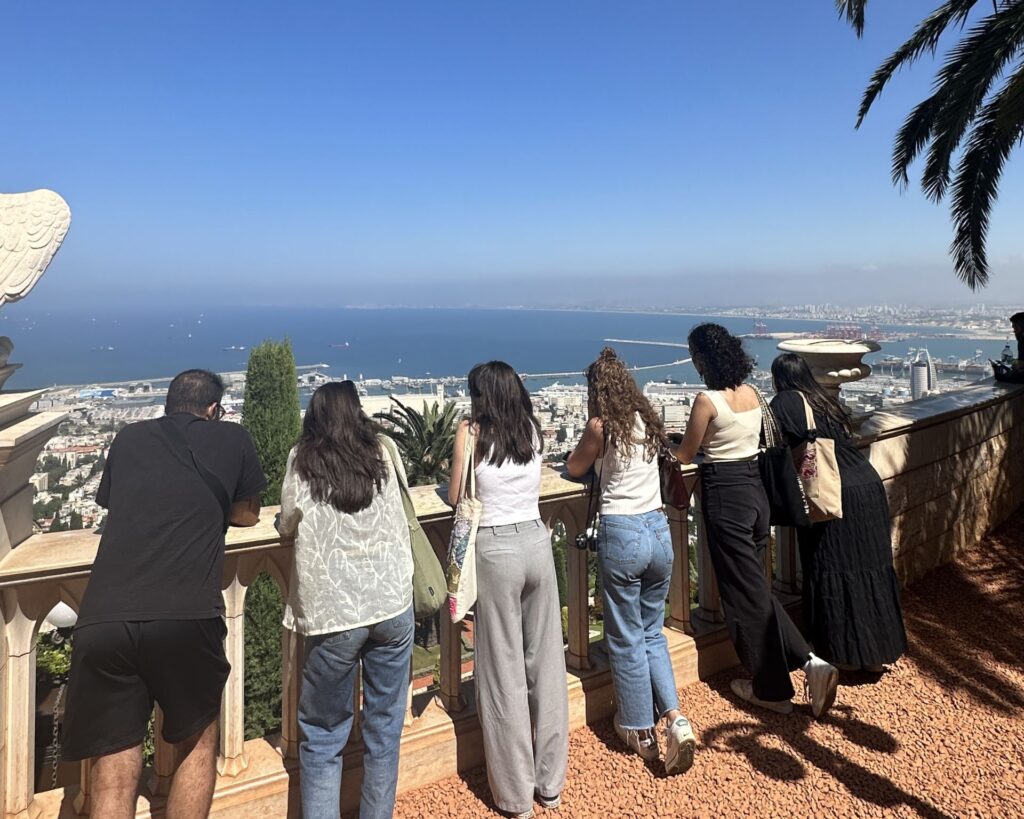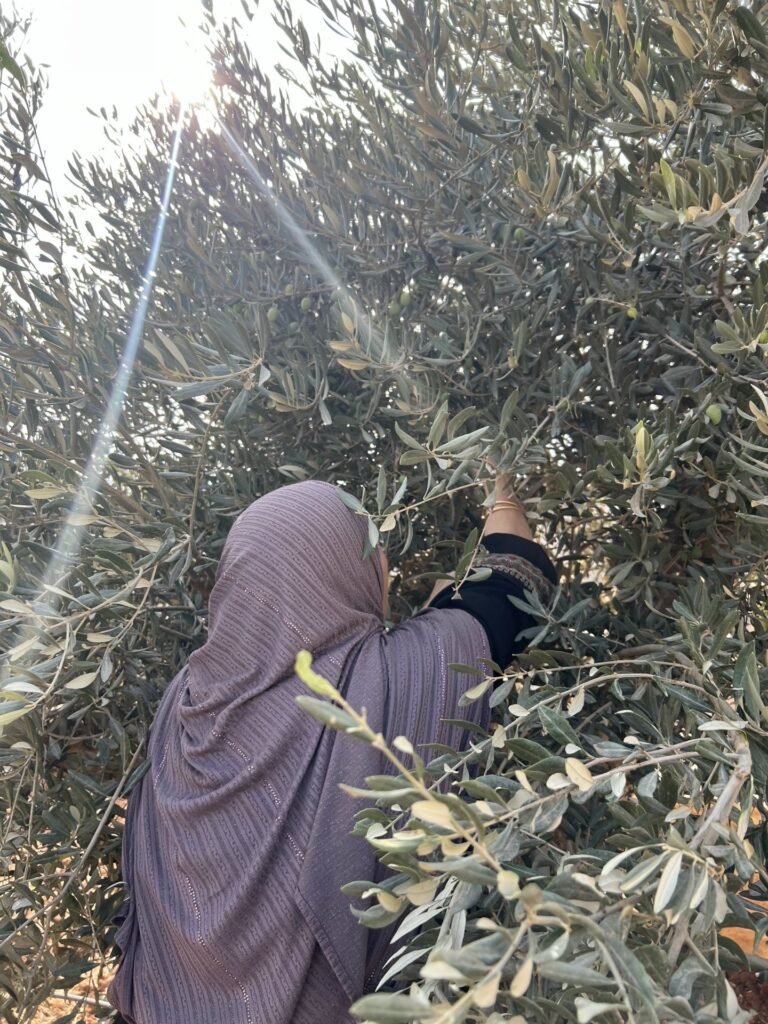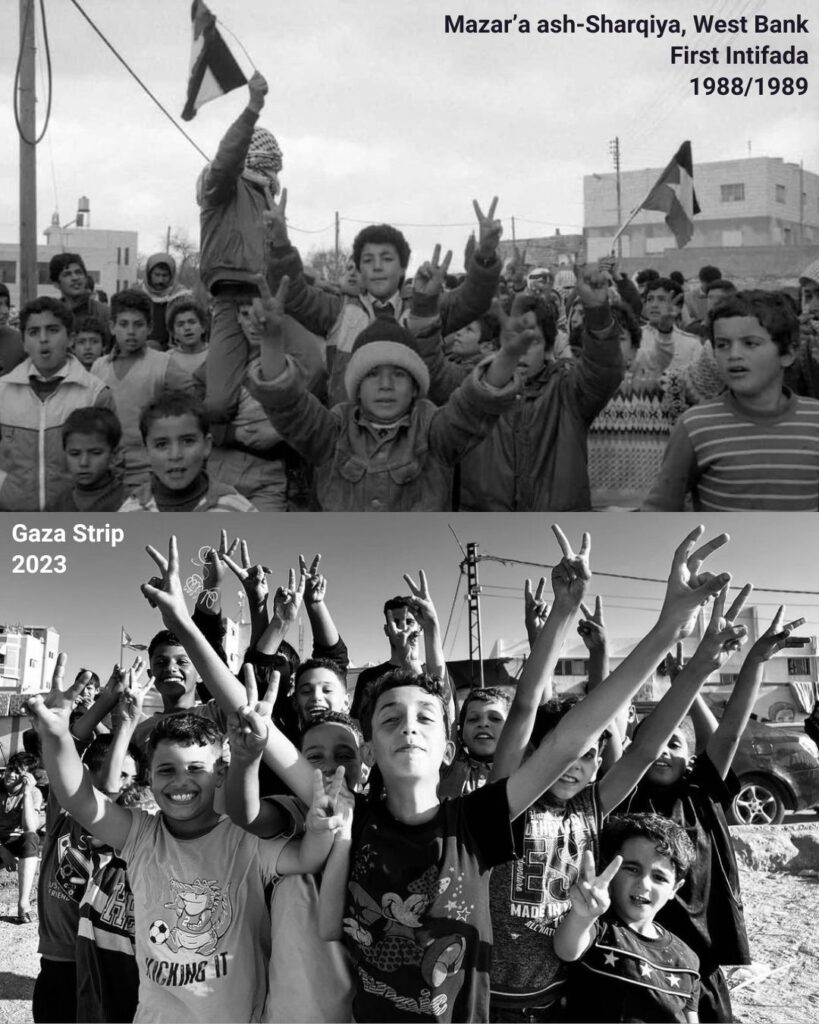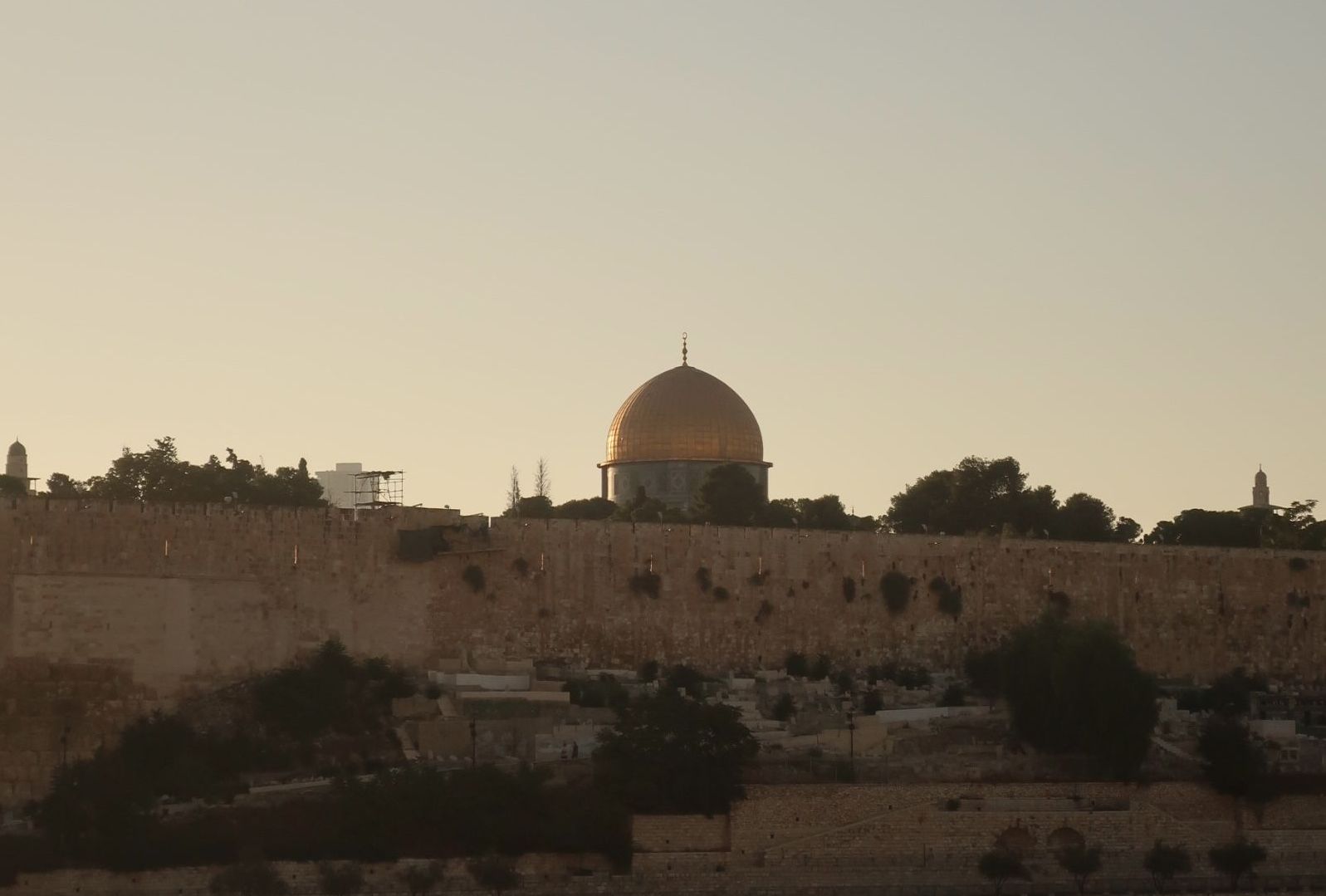To be Palestinian right now feels as if the whole world is observing your naked body, which has been bruised and mutilated for more than 75 years. Everything is out in the open. “How much can it handle?” the torturer asks. “What if we trap it? What if we poke it here? Or maybe from here? How much longer until something bursts? Could it survive without food or water? Surely something’s got to burst. Ah, this side over here seems to be getting aggravated — will this be the part of the body that bursts?” And then, when something does inevitably burst, there is one question that everyone seems to ask, which I’ve come to realize is nothing but rhetorical: “Why did it burst?”
To be American is to know, or finally realize, that you have been not only complicit but also a catalyst in this body’s torture for decades. And to be a Palestinian American feels as though you are yelling, between the stabs and punches, at those who are standing by: “Do you see this? Is anyone going to do anything? Do I deserve this?” While through it all, you know that you are inadvertently funding your own torture.
Gaza has been under attack for more than 30 days, and there is no end in sight to what can only be called a genocide — an extermination, unfolding before our eyes in real time on TV and on social media. Entire regions of the city have been flattened to rubble as the West continues to unapologetically support Israel’s genocidal intent under the guise of “self-defense,” branding it a war between two equal entities rather than what it is: a war waged on a strip of land that Israel has occupied for decades, and which is filled to the brim with civilians, many of them displaced from elsewhere in historic Palestine.
There is no way for those in the diaspora to separate themselves from the Palestinians in Gaza, any more than it would be possible to separate the parts of a single living body. Those 2 million people under siege could be any of us, were it not for our ancestors being expelled or displaced somewhere else. I see my childhood self in every little girl who weeps for her mom to come back to life, and in the remnants of a dead child’s burned face.
It was only a few weeks ago that I was in my home in Ramallah, West Bank; I returned to the United States just days before the war started on Oct. 7. I wish I could say I had a premonition that the inevitable burst was going to happen when it did, and at such a scale: that Hamas would breach Israel’s security, previously assumed impenetrable, killing 1,200 Israeli civilians, military officials and soldiers, and taking 240 people hostage in an ambush that no one could have thought possible; that Israel would respond with the indiscriminate bombardment of the already besieged and impoverished Gaza Strip, killing more than 11,000 people, including upward of 4,500 children and babies — and counting. Few could have imagined that more than 170 people were going to be shot by either the Israeli army or settlers in the West Bank (which was already experiencing its deadliest year since the Second Intifada), that more than 2,000 were going to be abducted, or that dozens of Palestinians, who hold citizenship in the so-called only democracy in the Middle East, were going to be arrested for allegedly “condoning terrorism” on social media. But the days before, for me, gave no such indication. It was the same old, same old.

When you visit your homeland, you must subconsciously relinquish every basic right that is inalienable for you as an unoccupied American so that you can endure the occupation as a Palestinian. And you try, for the time being, to forget that you are your own occupier.
Every checkpoint you pass, every Israel Defense Forces (IDF) soldier who is stationed there (most of whom are close in age to me) and every machine gun that they point can be traced right back to you. And in order to enjoy the simple right of being where your parents, your grandparents, your great-grandparents and their parents lived, you must accept the potential violence — whether from the military or armed settlers — that may be waiting for you at every turn.
When you spend time under occupation, your standards must recalibrate. With every humiliating experience, your threshold for tolerating discrimination gets higher. The struggles of the occupation seep into your daily life, creating a new normal that makes you forget that such a dehumanized existence would be impossible to accept in your other home. But despite your ability to function in your occupied parallel reality, your subconscious is still absorbing every act of injustice you face or witness — inching you closer and closer to your own imminent burst.
The longer you’re in Palestine, the easier it is to ignore the pungent smell of feces every time you drive down the street known as “Oyoun al-Haramiya” (Eyes of the Thief), where Israeli settlers are known to dump their sewage. You start to learn which checkpoints close earlier or later so your 30-minute commute doesn’t turn into three hours waiting in the long lines for “security checks.” You start memorizing the corrections that Google Maps or Waze make when navigating because these apps don’t account for the differences between the Jewish-Arab segregated roads and could take you through armed Israeli settlements that bar entry for Palestinians and, in fact, pose a threat to your life if you are Palestinian. When the IDF conducts its weekly military raids in the northern West Bank villages of Nablus or Jenin and kills a young person, and this dead youth becomes a “shaheed” (martyr), you know that all shops in the city will be closed until the evening. With all these protocols in mind, your routine when leaving the house becomes muscle memory — phone, keys and your designated green-colored “haweeya” ID card, which marks you as Palestinian and therefore determines where you can drive, walk, sit, eat, drink, patronize and live.

And when you leave that dehumanizing experience, supported by the U.S., and return to America, there is always a transition period for a Palestinian American to revert to their unoccupied self: a time needed to detach yourself from a deep sense that you are inferior, second-class and a “security threat” in your own land. With each passing moment on your 12-hour flight back to the U.S., it’s like you time travel from the Jim Crow era to present-day America. You slip on the armor that you had to take off the second you got to Palestine, where your U.S. citizenship and all the protection it affords you in the world is stripped of its power, and your Palestinian-ness overrides any human rights and civil liberties you have elsewhere. Whether it’s Shireen Abu Akleh, a Palestinian American who was assassinated in 2022, or Omar Assad, an 80-year-old Palestinian American who was killed at a checkpoint this summer — we know that our U.S. passports don’t protect us from the Israeli regime, and they will not ensure us justice when we are killed.
The second you land, you notice that the anxiety over whether you can be let into your own home has disappeared. The thought of being detained for no reason now seems impossible to comprehend — despite it being a distinct possibility only 12 hours earlier. You don’t have to expend energy analyzing the mood of each border patrol officer to try to get into the right line. Rather than feeling like you’ve snuck into your own homeland, you may even hear a “Welcome home.”
But this time is different. Because of the timing of my trip, I have not been able to shed my feelings of inferiority. As I sit here in my Brooklyn apartment, these feelings have only grown. And I have never felt as subhuman as I do right now.
For the past month, I and every other Palestinian — Christian and Muslim — have been internalizing everything that is being said and done. And it has not been without consequence. As I hear the Western public worry about their safety and lock themselves inside their homes, I have come to feel as though I — a 5-foot-2 Palestinian woman — am the one causing fear. Seeing Palestinians and their allies as perpetrators has become so normalized that Republican representatives like Ryan Zinke have even proposed to expel all Palestinians from the U.S. (though it’s not clear where one would send “stateless people”) and ban them from entering, while simultaneously supporting the bombing of what remains of the home we do have, using American-made and American-financed lethal force.
The politicians and mainstream media may be saying “they,” but all I can hear is “I.” I am a “child of darkness.” I am a human animal. I am a barbarian. I am a savage. I’m both a terrorist and a human shield. I don’t exist. I am nothing but a bag of limbs being carried by my father. I am a security threat. I am a price that must be paid. I am the inevitable, the expected and accepted collateral damage.
And rather than being met with the empathy of world leaders, we are instead vilified and blamed. The West’s Holocaust guilt, something that has nothing to do with me or my ancestors (despite Israeli Prime Minister Netanyahu’s cynical attempt to exonerate Hitler and blame the Holocaust on Muslims), has been projected onto the Palestinians since 1948, crippling us as we carry the burden of sins that were never ours. So Israel’s occupation is our fault. The endless siege on Gaza is our fault. And the fact that there is any form of resistance to the knee that has been on our necks for decades is our fault.
As we are perpetually gaslit about our entire existence, I can’t help but ask: At what point in history has there ever been an obedient occupied people? How would they, the leaders of the free world, prefer for Palestinians to resist the occupation? Or will they ever be honest enough to tell us that we are doomed to either be occupied or expelled from our homeland for all eternity? That — if you allow me to say the parts that go unsaid — since we “look Arab” and speak Arabic, why don’t we just pack up and move to some Arab country, any Arab country, settle there and get on with our lives, and never speak of Palestine again?
It has been said multiple times by Israeli officials and mainstream media alike that the Hamas attack was Israel’s 9/11. I think Muslims and Arabs around the world would agree that there are clear similarities to 9/11 — not only because of the immense loss of life, but also because of the almost identical reaction the West had in 2001. Collective punishment for the Oct. 7 attack is undoubtedly happening now to the Palestinians in Gaza, who have either been killed directly by the record-breaking number of Israeli airstrikes or are teetering on the brink of survival while stuck under the rubble — with no food, water, electricity or telecommunications. It is also, albeit on a much smaller scale, being meted out to the Palestinian diaspora, pro-Palestinian supporters, Arabs and Muslims internationally. Whether it is a journalist who has lost their job or a student whose face is being plastered around their campus, accused of being an antisemite after calling for a cease-fire — we are all suffering punishment for actions that were not our own, in much the same way that all Muslims in the West were collectively punished post-9/11.
The Palestinian diaspora in the West is in its own remote Gaza, where screams can be heard over the walls, but there is no response and no support to be found. You can even hear the cheers in the background, the same ones that can be heard from nearby illegal Israeli settlements as they watch the white phosphorus bombs — whose use on heavily populated civilian areas like Gaza is prohibited by international law — rain down on the strip. Over the decades, with every stance we have taken to assert our existence and resistance, we have been met with either deafening silence or vitriol — and I still don’t know which is worse.
There is a word in Arabic that comes close to capturing the sense of devastation of which I speak — one that many Arabs and Palestinians have been saying epitomizes their state of being in this moment. It begins with the letter qaf — a hard “K,” which is pronounced deep in the throat. The second letter is hah — a simple “H,” a sound we make in our chest, near the heart. When you say this word, your breath moves from your throat to the heart. Qahr. It has no equivalent in English, but it means something like a profound sense of heartache, like the grief of a parent for their lost child, the grief of a people for their lost homeland. Yet I cannot help but think that, amid the rubble and the enduring stench of death, a ray of light inevitably breaks through the cracks. And so, hope must endure.
The late revolutionary Palestinian poet, Mahmoud Darwish, encapsulates the intense qahr that Palestinians in Gaza have been living with for decades in his poem, “Silence for Gaza”:
What is beautiful about Gaza is that our voices do not reach it. Nothing distracts it; nothing takes its fist away from the enemy’s face. Not the forms of the Palestinian state we will establish whether on the eastern side of the moon, or the western side of Mars when it is explored. Gaza is devoted to rejection … hunger and rejection, thirst and rejection, displacement and rejection, torture and rejection, siege and rejection, death and rejection. Enemies might triumph over Gaza (the storming sea might triumph over an island … they might chop down all its trees).
They might break its bones.
They might implant tanks on the insides of its children and women. They might throw it into the sea, sand, or blood.
But it will not repeat lies and say “Yes” to invaders.
It will continue to explode.
It is neither death, nor suicide. It is Gaza’s way of declaring that it deserves to live.
It will continue to explode.
It is neither death, nor suicide. It is Gaza’s way of declaring that it deserves to live.
The ray of hope is that the diaspora’s personal campaigning and the humiliation of having to insist that the Palestinian people do indeed exist, have always existed and deserve to continue to exist are starting to come to fruition, resulting in what seems to be the largest international anti-war movement since the 2003 invasion of Iraq. For the past month, main thoroughfares in every major city around the globe have been shut down by a sea of Palestinian flags, despite the political push to turn the colors that symbolize a dispossessed nation into some institutionally recognized “antisemitic” emblem. The flags of other people and nations that have also been colonized, ethnically cleansed and uprooted from their homes continue to intertwine with the Palestinian flag. Native Americans in Philadelphia have performed their rain dances and the Māori people in New Zealand have performed the haka in a display of solidarity with Palestinians, just as Jewish people sang echoing hymns in Grand Central Station in New York City amid their chanting of “Not in our name.” Celtic football fans in Scotland flooded a stadium with Palestinian flags, even after they were explicitly ordered not to. From D.C. to Jakarta, a record-breaking number of protesters have been gathering together and calling for a cease-fire.
Yet despite all this grassroots international support, it seems that we have no choice but to watch as Western leaders continue with their own agendas. And those who have just tuned in must grapple with confusion, wondering to themselves: How is this still happening? How is all this carnage not enough? This, in and of itself, reveals much about where the Palestinian movement has been since the 1960s; that is, stuck, with no amount of international pressure able to shift it. And as the leaders claim that this conflict is “too complicated” to understand and resolve, as they hide behind the simplistic and convenient myth that Jews and Arabs “have been fighting for thousands of years,” I beg them to mirror the courage of so many young Americans — Jewish, Black, Brown, white or Asian — who have the insight and moral integrity to acknowledge the grotesqueness of muzzling the rights of one population for the perceived comfort and security of another. No amount of debate, tongue-twisting or war of narratives over a one-state or two-state solution can resolve anything without acknowledging the trauma that Palestinians have continued to endure, just as no amount of military hardware and might will make a country secure without truth, reconciliation and justice.
Even while knowing that today’s world leaders, especially the U.S., may never express this sentiment, Palestinians persist. We endure. We continue. We organize and hope and look to exhaust any opportunity that we can take to bring us one step closer to the status that should be bestowed upon every human: to live freely and in dignity. Indeed, the more we are dislocated from one another, the more we are so cruelly and callously killed, the more we are dispossessed of our homes, olive trees, beaches and history, the stronger our vision of a free Palestine. The more we lose, the more we resist. Hamas could be eradicated tomorrow, but our resistance to the occupation will remain and grow.

Perhaps to some it sounds insane to keep banging on a locked door that has never once opened and expect that one day it will; to recount to indifferent leaders our grandparents’ stories from the Nakba, our parents’ stories of walking through tear gas to get to school during the First Intifada, and the persistent struggles that our families still endure daily in what’s left of Palestine; to continually carry the burden of proof and feel the need to inform, to teach and to correct the record with facts and figures that we have come to memorize by heart since we were 10 years old, from the writings of Zionist founder Theodor Herzl to the Balfour Declaration, the Oslo Accords and the sometimes gut-wrenching statements of indifference spoken by our own elected politicians in the West. But with all this generational trauma, hope, too, is inherited, rooted in an endless quest to cure the homesickness that has fixed itself in our psyche and DNA, like the “hereditary illness” eulogized by Darwish in his poem, “And We Have a Land”:
And we still love you, our love is a hereditary illness. A land … when it banishes us to the unknown … it grows.
Become a member today to receive access to all our paywalled essays and the best of New Lines delivered to your inbox through our newsletters.



